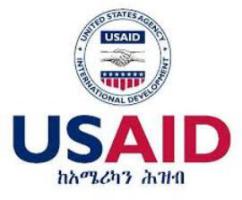The United States Government, through the U.S Agency for International Development (USAID), today announced the launch of the five-year, $40 million Community HIV Care and Treatment project.
Through the project, USAID aims to contribute to the 90-90-90 global goals, which are 90 percent of people living with HIV diagnosed, 90 percent of diagnosed people on antiretroviral treatment (ART) and 90 percent of people in treatment with fully suppressed viral load by 2020 in Ethiopia.
The Community HIV Care and Treatment project is funded through the U.S. President’s Emergency Plan for AIDS Relief (PEPFAR) and aims to improve the lives of People Living with HIV/AIDS through its people-centered approach, increase health system efficiencies and create access to treatment for everyone irrespective of their social and economic status.
This activity will provide targeted HIV testing services to priority populations (groups with a high risk of acquiring HIV) in 200 woredas with integrated referral linkages, strengthen community-based HIV/AIDS case management with individualized action plans and establish a robust partnership and coordination mechanism among facility and community stakeholders. In addition, the project will pilot innovative approaches to HIV service delivery.
The project will improve the delivery of ART services by:
· Improving adherence to treatment by tracking and reengaging those people living with HIV that have been lost from antiretroviral treatment, including through the use of technology solutions, such as SMS reminders.
· Building the capacity of local organizations, including associations of people living with HIV, religious institutions, Health Extension Workers/Health Development Army, and improving systems to provide high impact HIV/AIDS prevention, care and treatment services at the community level to ensure the long-term sustainability of activities.
· Increasing data availability to improve decision making for community health services.
“We’re convinced that creating access to HIV testing for the most vulnerable people at the community level, and then ensuring the referral of identified HIV positive cases for initiation of ARV treatment at health facilities, will offer opportunities for people who are missed through other approaches. A one-size-fits-all model of HIV services simply cannot work for the more than 720,000 people living in Ethiopia today with HIV. Differentiated care is a responsive, client-centered approach that simplifies and adapts HIV services across the cascade to better serve individual needs and reduce unnecessary burdens on the health system,” said Mission Director, Leslie Reed.

